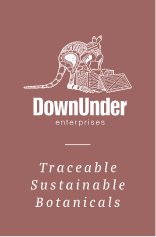Down Under Enterprises grows, produces, exports, and markets traceable
and sustainable native Australian essential oils and botanicals grown on our farm, Buhlambar, and from small growers across Australia producing unique essential oils and botanicals from plants native to Australia.
G’day mate,
Wildfires raging across the US West Coast bring back nightmares of last season’s severe Australian bushfires. Furthermore, tropical storms across the Asia Pacific region and hurricanes throughout the US East and South Coasts are occurring at historic rates. While the political debate continues, the global scientific community is unified – the world needs to act together towards tangible Sustainability goals. As a signatory to the United Nations Global Compact, Down Under Enterprises is committed to fulfilling this vision, acting accordingly across our global operations - offices, farms, warehouses.
This month we took the Australian office team up to the farm (using 100% carbon offset credits for our flights) for our annual Team Farm Day. While there, we educated the staff on our range of sustainable farming initiatives, rolled up our sleeves to complete the planting of our Koala habitat, and learned about the new essential oil plantings happening next month. Unfortunately our European and US sales team were not able to join us due to the continuing COVID restrictions. You can, however, learn about Charles, one of our US sales staff in this month’s newsletter.
Another sustainable product we offer is Buddha Wood Oil. Our growers are long-standing friends who began harvesting this native tree and steam distilling the oil many years ago. While Buddha Wood Oil has been a perfumists ‘secret ingredient’ for years, the functional benefits of this unique oil are only recently coming to light. Filled with rare sesquiterpenes called Eremophilones, Buddha Wood Oil’s future as a fragrance and functional ingredient is looking bright.
All the best – stay safe - and enjoy this month's newsletter. Thank you.
Sincerely,

IN THE NEWS
The threat of Koala extinction is shaking up Australian Politics.
A recent Australian Federal Government inquiry warns that koalas will be extinct by 2050 in the Australian state of New South Wales if protective action is not taken. To ensure their survival, the development of new habitats through dedicated national parks is needed, together with alteration to farming and forestry land management practices.
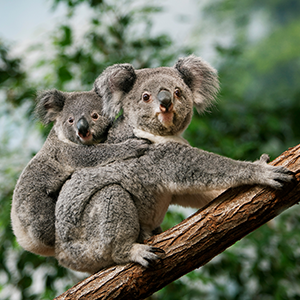
The greatest threat to the koala’s survival is the loss of habitat, introduced diseases, and the ongoing effects of climate change - including bush fires.
Unbelievably, Australian government factions are clashing over measures to protect the habitats of the animals that survived last year’s bush fires. In recent weeks, the leader of the New South Wales Nationals brought the Government to near collapse over new Koala habitat protection laws. The Premier stood her ground on the issue, demonstrating clear and strong government direction on sustainable habitat for native Australian wildlife.
Committing to sustainable practices is at the heart of our operating principles at Down Under. We believe that everyone can make changes in this direction. In addition to growing and supplying Australian Essential Oils, we invest extra time and resources in cultivating and expanding a natural eco-system on our farm to encourage the return of native animals to our land. One way we do this is through planting trees at our dam to encourage birds and beneficial insects. In turn they help us by feasting on insects detrimental to Tea Trees. As well, this past week at the farm we completed our “Koala Corridor”, establishing a habitat of over 1500 koala food-species-specific Eucalyptus trees along more than 1.5 miles of our boundary riverbank to help preserve and extend the natural habitat of Australia’s favorite marsupial.

FARM UPDATES
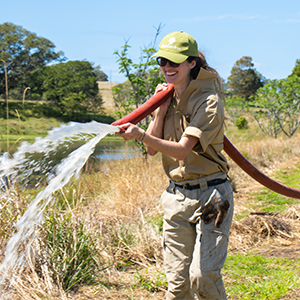
This month we had our annual team trip to the farm where the office staff can participate in some of the farming activities to deepen their understanding of the farming processes and our Cycle of Sustainability. Unfortunately, the whole team could not be there this year due to current travel restrictions. The group that did attend was able to complete the planting of the koala corridor via the planting of Eucalyptus trees as well as reinvigorating the plantings at the entrance to the farm. A great time was had by all through the hard work, sweat and laughter. We took a hay wagon ride around the property - Buhlambar is looking particularly green and picturesque this time of year. We saw the new dam development works in progress, to improve our water conservation and sustainability initiatives. Next year’s trip we expect to be completing the plantings around our irrigation dam.

TRACEABILITY
Our Buddha Wood is harvested in cooler weather.
This month we caught up with Di and Andy, the harvesters, and distillers of our Buddha Wood Oil.
1. How long have you been involved with Buddha Wood?
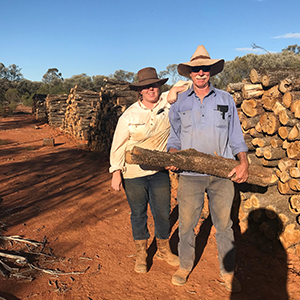
We have been involved in harvesting Buddha Wood trees and distilling the essential oil around 12 years from early experimental work to now.
We source our Buddha Wood trees from a local land holder/farmer in NSW (pictured) which adds income to their business and assists them in managing this particular species on their property.
2.Where is your farm located?
This property is located in the central outback of New South Wales. The harvesting of the Buddha Wood logs has provided an income for property owners. This has been especially well received during the recent severe drought conditions eliminating the normal farm income from grazing and cropping.
3.What are some of the traditional therapeutic applications of Buddha Wood, as used by the Australian Aboriginal people?
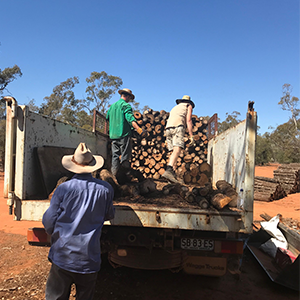
Traditionally the Aboriginal native Australians burned these types of timbers to release the oils for ceremonial purposes. and they also used the ground wood in topical rubs and poultices, which they created for treatment of various skin conditions.
4.What kind of products include Buddha Wood in their formulations today?
Buddha Wood Oil has been used in modern times in perfumes, skin care products, essential oil blends for aromatherapy, as a standalone oil used in diffusers, mixed with oils that work well with it. Buddha Wood’s aroma is purported to have calming properties.
5. What sustainability practices do you have in place on your land?
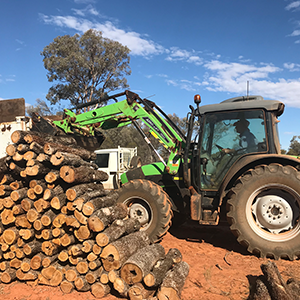
This tree is considered to be an invasive woody species by the state government. By removing the larger trees for use in essential oil production, there is minimal waste after harvesting. The timber is a prolific grower and by removing these larger trees, it allows the next generation to grow.
During the harvest, the smaller branches and sticks and leaves that are left behind act as great barriers for the native grasses that come up underneath as they are protected from browsing. Subsequently, these new saplings will become bigger waiting for their chance to grow with the further harvesting that will occur in later years.
As Buddha Wood is a relatively new oil being introduced to the marketplace, the rate of harvest is quite minimal. Much greater harvesting capacity is possible without any issues for a sustainable and continued supply.

EMPLOYEE PROFILE
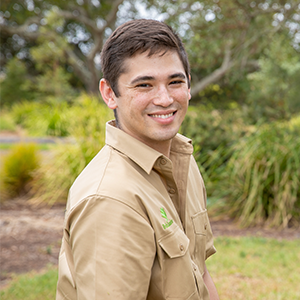
Meet Charles Adams, Our Business Development Manager for the East Coast of North America.
What is your role at Down Under Enterprises? I am the Business Development Manager, responsible for the Eastern region of North America
What did you do before joining the team at Down Under? I have always worked in the Natural Products industry, but prior to Down Under, I worked at a nutraceutical company focusing on raw materials for dietary supplement manufacturing.
What led you to want to work in the natural products industry? As a regular consumer, I wasn’t very educated of what happened in the process of getting a product onto the shelf. It wasn’t until I started my sales position in nutraceuticals that I began to learn of both the good and the bad side of the supply relationship to brands. It was through that enlightenment that I began to care about both what I was putting into and onto my body. I now ask my customers to do the same.
What do you love most about what you do? The fun part of my job is sitting down with customers and smelling the oils together. We get to talk about the aromas and discuss just how subjective smelling really is. The part I love is the ‘why’ and ‘how’ this oil got into their hands. The customer sees a vial of oil, but I see the culmination of a farmer’s hard work, sweat, and pride that went into creating it.
What’s your favorite way to spend the weekend? COVID has made things difficult this summer, but my wife and 15-month old son enjoy going to Coney Island and walking along the boardwalk. Funnel cakes, chili cheese dogs and Italian ice make it a fun day in the sun.

SUSTAINABILITY
Completing our Koala Corridor
The Down Under team spent some time planting more trees for our Koala Corridor at Buhlambar last week. A “koala corridor” is a continuous path of Eucalyptus and other food trees which helps to protect the koala population by allowing them to move between habitats, recolonize and maintain genetic diversity, as well as providing a food source. We began these plantings along the watercourse at our Northern property in 2016 and with these recent plantings we have now completed the 1.5-mile-long project.
It was rewarding for the team to see the results of previous years’ efforts. Pictured here is Down Under team member Juliana with the tree she planted for our Koala Corridor during our last trip in December 2019 and pictured again next to the same tree this month (September 2020)!
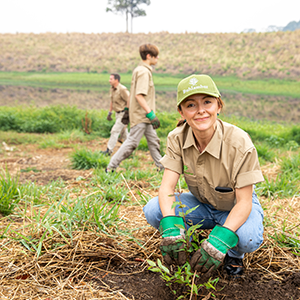 |
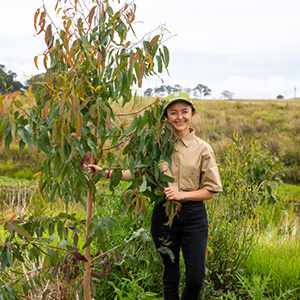 |
We look forward to seeing our local koalas enjoying their new habitat.
FEATURED SCIENTIFIC PAPER
Eremophila mitchellii (Buddha Wood) inhibits the growth of Salmonella
Eremophila mitchellii (commonly known as Buddha Wood) yields an Australian essential oil that has demonstrated strong antimicrobial activity against Salmonella typhimurium.
Researchers at Charles Sturt University conducted in vitro antimicrobial testing on a range of Australian Essential Oils via standard disc diffusion assays at concentrations of 100%, 10% and 1%. They found that Buddha Wood Oil demonstrated stronger antibacterial activity against Salmonella typhimurium than either Tea Tree Oil or Eucalyptus Oil, even at lower concentrations. Buddha Wood Oil was the only essential oil that inhibited the growth of Salmonella typhimurium at a 1% concentration.
Many foods can carry Salmonella bacteria, including raw meats and unwashed vegetables. Infection from Salmonella can cause food poisoning and sometimes result in hospitalization for those with compromised immune systems.
The addition of Buddha Wood Oil at low concentration can broaden the antimicrobial activity of new and existing products and may help against Salmonella.
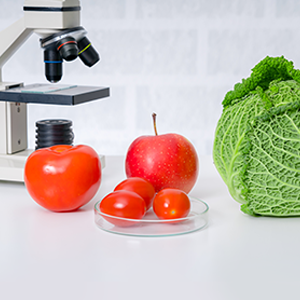
FEATURED PRODUCT

Consider Buddha Wood Oil for shaving and sweat rash applications
Buddha Wood Oil is known for its woody fragrance and soothing aromatherapy properties; however, this oil goes beyond olfaction, delivering multifunctional benefits as a skin soothing oil. Through its anti-inflammatory1 and antimicrobial properties against S. Aureus and C. Albicans2, Buddha Wood Oil may help alleviate two common skin complaints.
-
Shaving rash is experienced by both men and women. This type of infection known as folliculitis, occurs when the bacteria Staphylococcus aureus penetrates the hair follicles and is aggravated by various depilatory applications. Buddha Wood Oil demonstrates promising antimicrobial activity against Staphylococcus aureus at low concentrations.
-
Sweat rash is a common fungal infection that is most often caused by an overgrowth of the yeast Candida albicans that occurs between the folds of the skin as a result of humidity, friction and lack of ventilation between skin folds. Buddha Wood Oil showed stronger anti-fungal activity against candida than the more popularly known and researched anti-fungal Australian Tea Tree Oil.
The innate immunity of the skin represents the first line of defense against pathogens. While consumers are often tempted to use over-the-counter steroid creams on rashes, this ‘treatment’ may lead to extended infections. Recently the US CDC issued an alert on the use of steroid creams, even when combined with synthetic antimicrobials. Studies demonstrate a worsening of conditions1-6 . Steroid creams, even if combined with synthetic antimicrobials, can weaken the skin, leading to stretch marks and loss of pigmentation.
Certainly more studies are needed, but Buddha Wood Oil, with its demonstrated anti-inflammatory and antimicrobial functions, may offer a natural alternative to such synthetics.
To explore other Applications for Buddha Wood and our full range of Australian Oils, visit our Applications page.
References
- Verma S. Steroid modified tinea.external icon BMJ. 2017 March.
- Verma S, Hay RJ. Topical steroid‐induced tinea pseudoimbricata: a striking form of tinea incognito. external iconInt J Dermatol. 2015 Jan.
- Verma S. Emergence of recalcitrant dermatophytosis in Indiaexternal icon. Lancet Infect Dis. 2018 July.
- Bishnoi A, Keshavamurthy V, Dogra S. Emergence of recalcitrant dermatophytosis in India.external icon Lancet Infect Dis. 2018 March.
- Kumar S, Goyal A, Gupta YK. Abuse of topical corticosteroids in India: concerns and the way forward.external icon J Pharmacol Pharmacother. 2016 Jan.
- Ely JW, Rosenfeld S, Seabury Stone M. Diagnosis and management of tinea infections.external icon Am Fam Physician. 2014 Nov.
